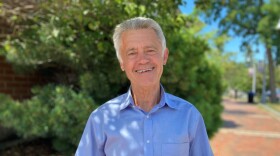As they face one of the largest presidential fields in generations, Democratic primary voters in New Hampshire are looking for ways to keep up with all the platforms and policy proposals.
But for voters of all stripes, navigating the news is more complicated than ever before. Political attacks on news organizations have undermined faith in the press, and as a result, media organizations are often drawn into the political fight of the day.
NHPR’s Daniela Allee talked with Democratic voters who are recalibrating the way they consume the news as they prepare for the primary.
Good food got three Upper Valley friends through last month’s debate watch party at a Mexican restaurant in Lebanon.
Eating chicken chile rellenos and fajitas, Minda Gowarty, and husband and wife Malcolm Schongalla and Kelly Corbett, watched intently.
These three have been friends for 10 years, and they all pay attention to the news. So naturally, politics comes up pretty frequently.
For a long time, Malcolm used the Google news app to find out what was happening.
“It was easy to get news from sources across the political spectrum. Right wing stuff, left wing stuff, moderate stuff. It was right there,” he said.
But that morning of the debate he’d had enough. He deleted the app from his phone.
Schongalla and his wife had noticed he was increasingly short-tempered after reading the news.
“I’ve just read a bunch of articles from dueling political spectrum news sources, and now I’m stuck again, in this crossfire of angry politics,” he said.

Now he goes to the major websites -- Fox, CNN, the New York Times -- which allows him to curate his media diet more. The Google news app algorithm which just seemed designed to get him to click on the most provocative headlines.
Minda Gowarty, Malcolm and Kelly’s friend, also works to add variety to her news feed. She knows she’s drawn to stories that confirm what she’s already thinking.
“My gut reaction when I think about a policy is to default left. If I hear something on the left, I think yes. Of course, right: left,” Minda said.
To be a more informed voter then, she says she makes a point of reading things she might disagree with.
“I think it forces me to think a little bit more, and to say wait. What is the other side? What’s more well-rounded? Where is this coming from?"
But unlike Minda or Malcolm, it can be hard for Kelly to read those other news sources.
“My blood boils too much when I’m reading right-wing stories,” she said.
But she does have someone she can rely on to tell her what the other side is saying: her husband Malcolm, who reads news from the left and the right.
"So I rely on him to kind of give me the synopsis," Kelly said. "What are they actually saying on the other side of the aisle."
Changing up news sources is one approach voters have taken.
Other folks, like Miriam Osofsky, are growing more skeptical about ones they used to rely on.
Osofsky is politically active, and climate change is her main issue. But the last few election cycles have left her feeling that the media is no longer an impartial moderator of the political debate.
She points to how, in her view, much of the press failed to take Bernie Sanders’ campaign seriously in 2016.
“I became more skeptical, and more careful about how I interpreted what I read,” she said.

Osofsky doesn’t really trust mainstream media, so she looks for news sources that are funded entirely by subscribers, like Democracy Now, a left-leaning radio and TV show.
“Mainstream media has an agenda,” Osofsky said. “There are very wealthy people who benefit from things as they are -- the oligarchy, want them to stay that way."
But she still has a subscription to the New York Times, and reads it most days at lunch, but selectively: yes to the climate coverage, no to the opinion page.
Cori Hirai, who lives in Lebanon, is taking a different tact altogether: she’s trying to be a news source herself using her social media accounts.
Hirai was born and raised in New Hampshire, so when she lived in the Midwest for 10 years, she had a very different primary experience.
She says she barely got to shake John Kerry’s hand when he swung through Ohio in 2004.
“I would have to rely on my friends in New Hampshire to tell me what was going on,” Hirai said. “So when I moved back to New Hampshire, I was like, ‘Ok, this is my job now!’ I’m going to be everyone’s source of information because I’m going to meet every single candidate.”
So far, Hirai’s met six of the 19 Democratic candidates. She’s created a Facebook album for this primary so her friends can flip through those posts easily.
Each one includes a selfie, with a brief analysis about the candidate.
“They should know enough to know it’s not the definitive evaluation of the candidate,” she said, “but it is a different perspective than what they’re going to get from a different kind of media.”
Hirai says she takes this seriously. She feels she’s reporting and telling stories that her friends back in the Midwest can’t get in local or national media.
She’s not trying to influence how they vote, but she does want as many people as possible to see what she posts.
She’s learned a few tricks to get Facebook to boost her posts: make sure to post selfies and reply to comments. In that way, she’s not that different from new outlets. She wants her stories to be read.








